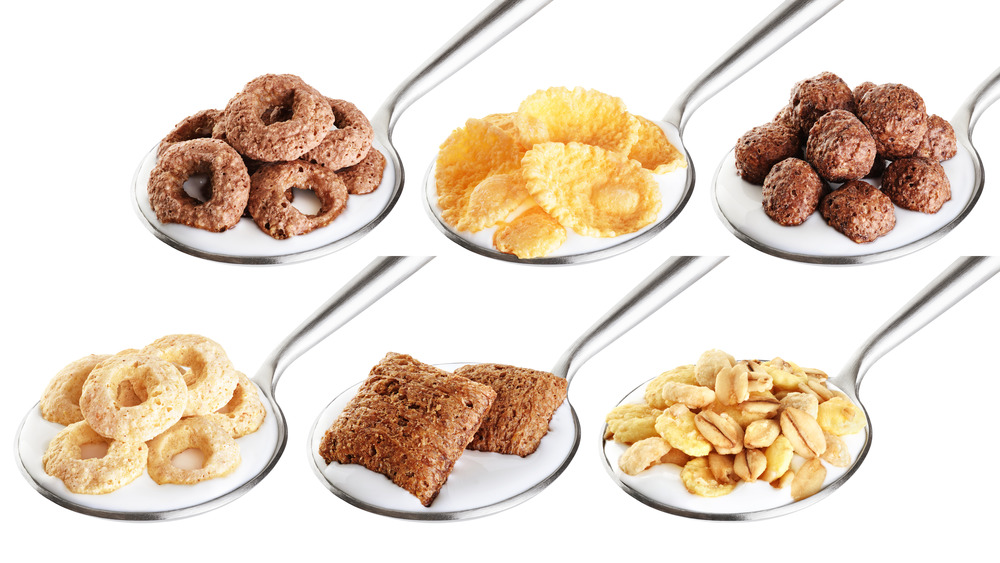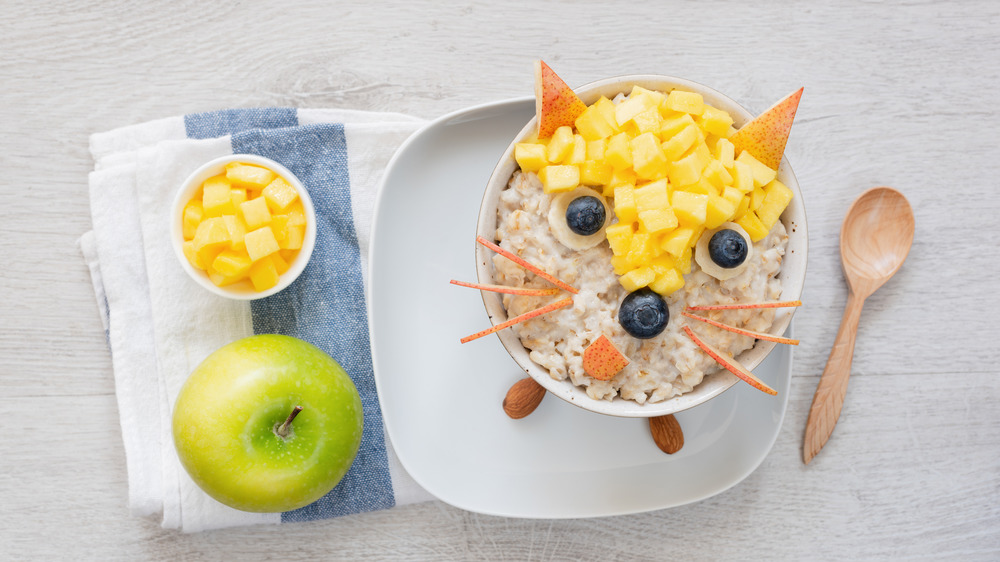Here's What Happens When You Eat Cereal Every Morning
How do you typically start your day? A big cup of coffee, for most of us. But do you remember to eat any food to go along with that java? (You should. Otherwise, it might mess up your stomach.) If your go-to breakfast is a bowl of cereal, you're in good company — the Food Network reports that 56 percent of Americans prefer a breakfast of cereal. (Sixty-five percent say what they really want is eggs, but let's be honest, who's got time to fix those on a weekday?) Many people (especially those of the millennial persuasion, according to FoodDive) also enjoy cereal at other times of the day, as well.
Are you actually doing your body any good by continuing the cereal habit, though? Nutritionist, chef, and food writer Robin Miller says that for many of us, maybe not, at least if your preferred cereal is "devoid of many nutrients and laced with sugar." While Miller admits that there are "plenty of whole grain, low-sugar, high-fiber cereals at the grocery store [such as] nut-and-seed-laced muesli and chunky, oat-studded granola," she is skeptical that most of us are making such choices.
Cereals today claim to be healthier than they are
Miller cites the nostalgic appeal of "noshing on big bowls of O's, flakes, and sugar-coated bits, basking in a sea of milk," as many of us did before rushing off to catch the big yellow bus to school, but says that just because our childhood favorites claim to be new and improved, that isn't necessarily so. She says that while they now tout being made from whole grain and without artificial flavoring and coloring, which, if true, she calls "a giant leap in the right direction," most of these cereals still aren't any great shakes in the nutrition department. "The fact is," Miller explains, "many of the top-selling cereals are still high in sugar and low in fiber."
As to why over-sweet cereals are problematic, not only are they high in calories and carbohydrates, but Miller also says that "sugary, sweetened cereals cause a spike in our blood sugar, which triggers an eventual crash, leaving us lethargic and with a hankering for more sugar." What's more, cereals that are low in fiber won't keep us full for too long, and they also have a negative impact on our blood sugar. Miller explains that "fiber is important because it digests slowly, which keeps us satisfied for hours and helps regulate our blood sugar level."
Cereals are made from grain that's over-refined
According to Miller, "Many wheat, corn and rice based cereals are made with highly refined grains." Does this mean that those grains are smooth and sophisticated and know just how to stir their tea when asked to an afternoon soiree by the queen? No, Miller goes on to explain that when it comes to grains, "[highly refined] means they're stripped of the nutrients and fiber found in their whole grain form."
Miller does say that "most cereals are fortified with the vitamins and minerals that were lost in processing, so one bowl is like taking a multivitamin." While she allows that "it's incredibly hard to eat the perfect diet every day, [so] fortified cereals help fill in the gaps, dishing up some of the nutrients we might be missing," it's still generally a better idea to get your nutrients directly from the foods themselves rather than from any additives they may contain.
Cereal every day provides too little variety
While Miller acknowledges that cereal is certainly a convenient way to start (or even end) your day, she says "it's always a great idea to add variety to your diet — to make sure you're checking all the nutrient boxes." This doesn't mean that you should cut cereal out of your diet entirely (unless it's one of those extra-sugary, might-as-well-be-junk-food ones) but that you should supplement your cereal routine with some different breakfast choices. Miller suggests: "One day, choose a high-fiber, low sugar cereal. The next day, enjoy some scrambled eggs and whole grain toast with nut butter. Day three, sit down to a warm bowl of old-fashioned oatmeal garnished with fresh fruit and nuts."
Okay, so her suggestions might work better if you have loads of time and can actually "sit down" to a bowl of anything on a daily basis, but bear in mind that oatmeal, eggs, and such also have their on-the-go versions (many of which are available at your local fast food drive-thru). If you can manage to add a little variety to your daily diet, Miller says that, "Mixing things up not only ensures a bounty of nutrients, it keeps you interested day after day."



